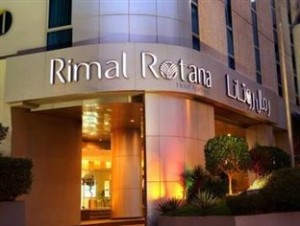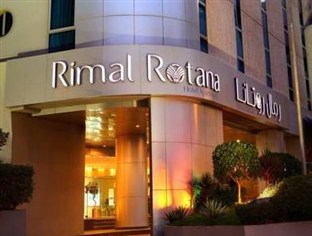 The hotel management firm Rotana expects to be the first international chain to set up shop in Iran since the 1979 Islamic revolution terminated all foreign hotel contracts.
The hotel management firm Rotana expects to be the first international chain to set up shop in Iran since the 1979 Islamic revolution terminated all foreign hotel contracts.The UAE-based group also expects to enter Afghanistan next year, as well as Turkey and Dar Es Salaam in Tanzania.
Internationally, Rotana has 50 properties under development, which would add 13,600 rooms by 2018. It would be in new markets such as the above-mentioned countries, as well as Qatar, Kuwait, Bahrain and the UAE.
Currently, Rotana has 17 hotels outside the UAE, mainly in Egypt and Lebanon.
The company has hotel projects in Tehran and in the pilgrimage city of Mashhad, which are expected to be completed from 2015 onwards.
It is also planning to open two hotels in Kabul in the next couple of years, and seven new Rotana properties in Turkey.
�Iran has a lot to offer commercially and culturally; trade has been phenomenal there,� said Omer Kaddouri, Rotana�s executive vice president and its chief executive.
�Mashhad is a popular religious place, and there aren�t enough quality hotels.�
The prospective easing of international sanctions against Iran has made the country�s market more attractive to hospitality groups such as Rotana.
�We are hoping the recent developments will bring prosperity to the region,� Mr Kaddouri said. �If we open three or four hotels in Iran, and the Iranian developers and businessmen can see what we can do, then � there�s loads of opportunities.�
John Podaras, a Dubai-based partner at consultancy Hotel Development Resources, said there was a resurgence in Iran�s hotel sector in 2007 when a number of smaller, private and local hotels emerged.
In 2008, the Dubai-based conglomerate Majid Al Futtaim acquired land to build a hotel in Iran, but it has since sold the plot.
�The Iranian hotel market offers considerable attractions to foreign operators and investors, a fact that hasn�t been lost to a number of UAE companies in the past,� Mr Podaras said.
�Iran�s years of isolation have left the hotel market very much in need of foreign expertise and investment, and there is considerable appetite within Iran to invest both in terms of funding and attracting suitable expertise.�
Although a tentative nuclear agreement between Tehran and six world powers last month would release US$4.2 billion in frozen Iranian oil assets and enable trade in gold, petrochemicals, cars and aircraft parts, there is no certainty regarding restrictions on bank payments.
However, that has not held back companies such as French car makers Renault and Peugeot Citroen from restarting trade talks with Tehran last month, The Wall Street Journal reported.
�On the one hand, even non-US companies have to comply with the sanctions or risk prosecution or commercial fall-out in their commercial dealings [even indirect ones] with the United States,� Mr Podaras said.
�The effective financial embargo creates great difficulties in payments being made to companies outside Iran, which in any case have become prohibitive for Iranian companies faced with ruinous currency exchange rates.�
Yesterday, the Iranian rial traded at 24,788 to the US dollar, compared with 9,687 at the end of 2008.
The existing luxury hotels in Iran are owned and managed by local companies such as Persian Esteghlal International Hotel in Tehran, and Homa Hotel Group, which owns properties in Tehran, Shiraz, Bandar Abbas and Mashhad.
Several luxury properties in Iran were operated by foreign firms such as InterContinental, Hilton, Sheraton and Hyatt before the Islamic revolution.
Rashid Aboobacker of Tri Hospitality Consulting said the number of international overnight tourists in Iran grew at an annual average rate of 10.9 per cent during 2007 to 2011, reaching 3.4 million in 2011. Religious tourism comprised 73 per cent of the total.
In Afghanistan, Rotana will open a 121-room luxury hotel apartment tower by the middle of next year, and a 250-room luxury property in 2015. Both properties would be close to the airport.
Emirates Airline�s daily flights to Afghanistan, which started this month, are said to be boosting business confidence in the war-torn country. The low-cost carrier flydubai has been servicing the sector since 2010.
Rotana said it would contribute 450 to 470 jobs oin Afghanistan, 90 per cent of whom would be Afghan nationals.
The security situation in the country, however, remains uncertain. President Hamid Karzai is yet to sign a deal that will allow American troops to stay in the country after next year. The troops are supported by a multitude of defence contractors who contribute to the local economy.
�For so long as security was being underwritten by the presence of foreign forces, the lack of suitable accommodation meant that the hotels that are operating there are quite profitable, with high average daily rates and favourable terms for the operators,� said Mr Podaras.
But Rotana has eyes on the bigger picture.
In Iraq, the group opened its second hotel in Karbala this month, and the country could get four Rotana properties in the next three years.
By The National�
The Iran Project is not responsible for the content of quoted articles.











